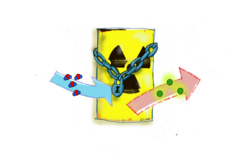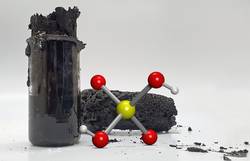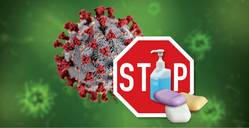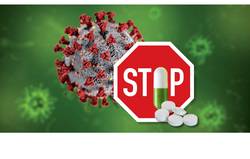

 |
Fact Sheet No. 12 (10 May 2022) Chemistry and final storage (to print as pdf ) |
 |
Fact Sheet No. 11 (13 October 2021) Tastes are different – a molecular look at beer |
 |
Fact Sheet No. 10 (26 July 2021) Citric Acid and Menthol: Natural, Synthetic, Biotechnological! |
 |
Fact Sheet No. 8 (26 March 2021) Insect proteins: a sustainable diet! (Printable as pdf ) |
 |
Fact Sheet No. 7 (23 March 2021) Biomass: the "new crude oil" (Printable as pdf ) |
 |
Fact Sheet No. 6 (4 December 2020) |
 | Fact Sheet No. 5 (12 August 2020) |
 | Fact Sheet No. 4 (1 July 2020) |
![Image credit: Diagram of the global carbon cycle from “Chemistry above the clouds” ed. R. Zellner and GDCh, chapter “CO2 and climate change” by M. Heimann and C.-D. Schönwiese, Wiley-VCH, 2011 (original edited; data from IPCC, 2007. Climate Change 2007: The Physical Science Basis. Contribution of Working Group I to the Fourth Assessment Report of the Intergovernmental Panel on Climate Change [Solomon, S., D. Qin, M. Manning, Z. Chen, M. Marquis, K.B. Averyt, M. Tignor and H.L. Miller (eds.)]. Cambridge University Press, Cambridge, United Kingdom and New York, NY, USA.) Bildnachweis: Schema des globalen Kohlenstoffkreislaufs aus „Chemie über den Wolken“ Hrsg. R. Zellner und GDCh, Kapitel „CO2 und der Klimawandel“ von M. Heimann und C.-D. Schönwiese, Wiley-VCH, 2011 (Original bearbeitet; Daten aus IPCC, 2007. Climate Change 2007: The Physical Science Basis. Contribution of Working Group I to the Fourth Assessment Report of the Intergovernmental Panel on Climate Change [Solomon, S., D. Qin, M. Manning, Z. Chen, M. Marquis, K.B. Averyt, M. Tignor and H.L. Miller (eds.)]. Cambridge University Press, Cambridge, United Kingdom and New York, NY, USA.)](/fileadmin/_processed_/2/8/csm_Abb-factsheet_klimawandel_faszi_3478f6ad43.png) | Fact Sheet No. 3 (22 June 2020) |
 | Fact Sheet No. 2 (11 May 2020) |
 | Fact Sheet No. 1 (28 April 2020) |
The most significant problems our planet and most of its inhabitants are currently facing are anthropogenic in nature. It is therefore also the task of people to recognize the problems and to solve them efficiently. Efficient means prompt and problem-oriented - beyond political and (purely) economic interests.
A large part of the problems can (only) be dealt with in a meaningful way by drawing on chemical expertise. The creation and dissemination of factually incorrect connections, which are sometimes used as a basis for political decisions - and wrong decisions - are therefore particularly worrying for scientists in general and for us chemists in particular.
In particular, the chemical aspect in problem areas such as CO 2 emissions and CO 2 binding, air pollution or the spread of microplastics means that we as chemists see it as our duty to compile and publish reliable facts that are not driven by lobbying. We also see it as our task, in cooperation with experts from related disciplines (medicine, biology, physics), to design scientifically sensible and economically and ecologically feasible solutions and to publish them.
We want to be seen as a body that brings together the expert knowledge of top researchers in the relevant subject areas and makes it available to both the scientific community and the general public through various channels.
In addition to the President of the GDCh, the founding staff initially includes chairpersons of various Divisions and working groups of the GDCh, who in the next step will nominate experts who will complement the team of those responsible.
Prof. Dr. Stefanie Dehnen, Philipps University of Marburg (Wöhler Association for Inorganic Chemistry, member of the GDCh Board and GDCh vice-president 2020-2021). Coordinator
Dr. Thomas Früh, Arlanxeo Deutschland GmbH Leverkusen, (FG macromolecular chemistry and spokesman for the FG on the GDCh Board)
Prof. Dr. Birgit Glüsen, Technical University of Cologne ( Department of detergent chemistry)
Dr. Stefan Hahn, Fraunhofer ITEM Hannover (Department of environmental chemistry and ecotoxicology)
Dr. Jörg Häseler, food chemistry Journal (Society of Food Chemistry)
Prof. Dr. Anke Krüger, Julius Maximilians University of Würzburg (Liebig Association for Organic Chemistry)
PD Dr. Thomas Letzel, AFIN-TS GmbH and TU Munich (AG vocational education)
Dr. Franz von Nussbaum, Nuvisan ICB GmbH, Berlin ( medicinal chemistry Department)
Dr. Joachim R. Richert, BASF SE Ludwigshafen ( analytical chemistry)
Prof. Dr. Torsten Claus Schmidt, University of Duisburg-Essen (Society of Water Chemistry)
Prof. Dr. Wolfgang Schrader, Max Planck Institute for Coal Research, Mülheim (Department of chemistry and energy)
Prof. Dr. Peter Schreiner, Justus Liebig University Giessen (member of the GDCh Board and GDCh president 2020-2021)
Dr. Carla Seidel, BASF SE Ludwigshafen (Member of the GDCh Board and GDCh Vice President 2020-2021)
Prof. Dr. Clemens Walther, Leibniz University Hannover ( nuclear chemistry)
Dr. Claudia Weidlich, Dechema eV Frankfurt (Department of electrochemistry)
Dr. Ursula Westphal, IGAFA eV Berlin ( Chemists in Civil Service)
This page has been machine translated. If you have any feedback or comments please feel free to contact us. 
last modified: 03.06.2024 15:29 H from Translator